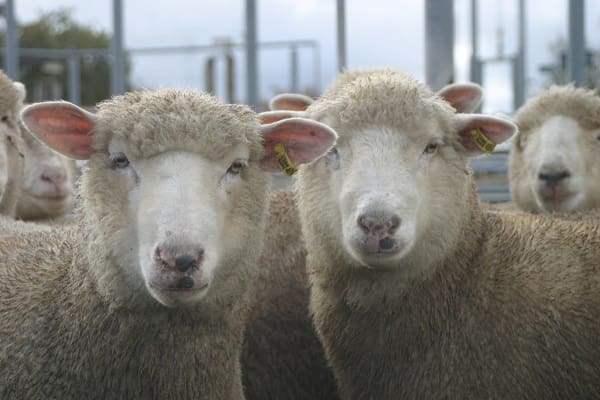
Lambs with electronic ear tags.
A SCOPING report on establishing a national electronic tag tender system uncovered a lack of support for using industry or government funds to develop and sustain it.
Sheep Producers Australia refused to release the National EID (Sheep) Tag Procurement Scoping Report it commissioned, with SPA chair Andrew Spencer claiming it was not of high interest or priority for producers, although many participants “emphasised the need for timely resolution of this matter to enable thorough discussions on transitional EID support.”
Sheep Central has obtained a copy of the report (click here) that concluded maintaining the status quo in tag purchase systems presents a low risk to SPA, “although the potential to deliver low cost EID tags for producers will not be realised.”
The funding issue was one of many highlighted in the report, although industry participants noted that a Victoria tag tender system successfully delivered lower price EID devices for sheep, cattle and goat producers, and identified the enhanced biosecurity data benefits for government.
The report said the costs of developing and implementing a national tag tender and procurement system would vary greatly depending on the model chosen and be influenced by the business structure of the entity used and the complexity of the procurement process.
“This will also affect the associated fixed costs and throughput related variable costs.”
Many participants surveyed for the report noted concerns with the Victorian NLIS Tag Supply System, including its complexity and lack of transparency; additional ‘red tape’, including duplication of tag accreditation processes; ongoing reliance on rural retailers to provide technical support and customer service; business sustainability for tag suppliers; and, intervention into a market that already provides this service.
“Specific to the commercial tag purchase system, mixed feedback was provided regarding price transparency and consistency of mark-ups, along with minor issues regarding regulatory processes.”
However the report’s participants also raised concerns about the expenses related to a system like the Victorian National Livestock Identification System livestock tag tender or supply system replicated at a national scale, including; governance and operational costs; and, costs associated with supporting regulatory requirements across multiple jurisdictions.
“Additionally, most participants did not believe these costs should be supported by industry levies or government funds,” the report said.
“Several participants did not believe that a new system should be established to replace a service that was already being provided by the market, and most indicated that it would not be palatable for a body implementing this system to make a profit (cost recovery only).”
The report said the majority of participants from all sectors agreed that the provision of government financial support to producers and across the supply chain during the transitionary phase of implementing EID regulation was critical to support efficient adoption of new regulation.
“Responses were mixed as to whether this should translate to direct support of EID tag costs.
“Longer term, participants acknowledged that government resources were finite and the costs of EID devices and associated equipment would likely become a cost of doing business,” the report said.
The report said more than half of the participants supported all NLIS species being included in a national tag tender and/or procurement system, should it be developed, with a smaller number supporting only small stock.
“A quarter of participants did not respond, as they did not support the system or did not have a position.
“Many participants believed that expanding the system to include more species would lead to increased complexity and cost, and most were in favour of the sheep industry recovering costs associated with including additional species,” the report said.
“However, they also acknowledged that some species already had mature systems and may not see benefit in joining.”
SPA and risk
The report said it is likely that the proposed national tag tender and procurement system, if managed by industry, would be a voluntary scheme making it highly susceptible to market forces (including losing market share) as other participants enter the market, or in this case, already exist.
“If a national tag tender and procurement system operates on a voluntary basis for both customers and suppliers, any organisation aiming to create and implement such a system must determine if a robust business case exists for the initiative.”
The report said the business case presented serves as an assessment tool to appraise the competitiveness of the proposed national tag tender and procurement system in a mature and densely populated market.
“While SPA may consider additional guidance on specific aspects, incorporating stakeholder feedback into the business case structure points to a significant level of risk, particularly concerning the value proposition, objectives, and the associated costs in establishing and sustaining the proposed national tag system.”
A national system modelled on the Victorian NLIS Tag Supply System is complex and carries significant inherent risks, particularly value proposition, objectives and cost, the report said.
“A group buying approach is less complex but still entails business risk as it will face significant competition in a dense market, necessitating a clear value proposition and commercial support (suppliers and customers) for success.
“A “compare the market” approach is relatively low in risk, functioning primarily as an information provider and connection point for producers and tag manufacturers.”

It is time to abandon electronic tags. SPA have lobbied for this without thinking of the cost.